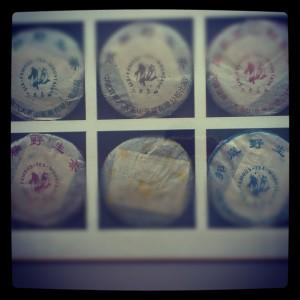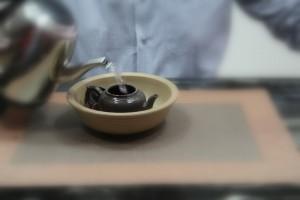Why does the tea in your cup taste the way it does?
Experts have broken in down into 7 categories, let us take a brief look at them:
1) Cultivar
Cultivar or the sub-breed or the plant is one of the most fundamental determinants in the taste of the tea.
Though all teas can be broadly categorized as originated from the Camellia Sinensis plant, each sub-breed has its distinct characteristic such as harvest yield, hardiness, taste and fragrance among others.
For example, the Jingxuan Wulong cultivar is a cultivated variant of the Qingxin wulong and has a natural milky taste. A jingxuan and a qingxin wulong grown in the same area and made by the same producer would have a distinctly different taste.

It's a pretty side but exposes the tea to light and heat
2) Cultivation Environment
The cultivation environment can include the following factors:
i) Soil conditions- red soil, yellow, granite, mineral content, pH, volcanic soil etc
ii) Elevation
iii) Direction of Sunlight- i.e. does it sit on the slope of the hill that faces the sun or the ‘shadowy’ side
iv) Mist and other forms of shades such as trees etc
v) Surrounding plants- e.g. fruit trees, herbs etc
These factors would affect the growth of the plant, harvest period and taste. Specifics to be discussed in a separate post
3) Climate and Weather Conditions
There are 2 components to this:
i) Weather during growth period
ii) Weather during harvest period
For i) excessive heat (>45°C) will kill the tea plants while plants only start to grow >10°C.
As with all other plants, the tea trees require sunlight and rainfall to grow as well and the amount would affect the nutrients that the trees receive.
Another underestimated factor is the weather during harvest period. Tea pickers in China generally do not harvest quality tea leaves during rainy days as it leads to a more pronounced grassy taste and causes the value of the leaves to plunge significantly. In addition, lack of sunlight would also hamper the ability to wither the picked leaves under the sunlight, essential in the production of oolong tea especially.
4) Cultivation Technique
Science has an important role to play the tea industry, notably in cultivation techniques. Tea research institutes such as Anhui and Hangzhou would continually research and uncover ways to improve the growth and quality of the tea plants to share with the growers. This leads to higher yields and better quality growth,
5) Production Technique
This is one of the oft overlooked aspects affecting the taste of tea especially in comparison with ‘terroir’- to import a foreign word from wine- but it is equally important to the taste of tea. Personally I feel this is most marked in oolong tea where the ‘yao qing’ (rattling process) and firing- especially high firing- is most dependent on the skills of the master.
For a batch of premium tea, the master would personally undertake these processes by hand to ensure the quality and the repute of the producer is intact. One small mistake, especially during firing could cause the value of the limited supply tea to plunge.
*For more details on 1-5 you can read this post on the authenticity of tea
6) Storage Conditions
The finest tea in the world tastes horrid if seasoned with medical oil or other foreign smells. That’s just one of the storage factors.
Light, heat, oxygen, odor and moisture all affect the shelf life and taste of tea.
(More on storage of tea)
7) Brewing Technique

In the past, much research has been devoted to the other 6 factors but this remains overlooked. For much of the past decades, brewing technique or ‘tea arts’ has been more geared towards the ceremonial and presentation aspect with less emphasis on the actual taste of tea.
From the choice of the appropriate brewing vessel, water, water temperature, steeping time, technique and other factors, the importance of brewing cannot be understated.
